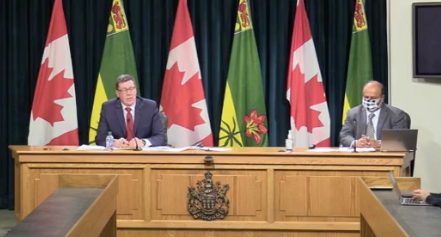
The provincial government says there’s no need for additional public health restrictions because Omicron appears to be less fatal than the Delta variant of COVID-19 so far.
Premier Scott Moe said in a Facebook Live appearance on Jan. 12 that the current public health orders -which require mask wearing and showing proof of vaccination in certain venues – will remain in place until the end of February, but no additional measures will happen.
“Restrictions have been necessary at times over the course of the last 22 months and I think at times they have been quite effective in previous waves,” Moe said. “It’s quite clear now, at least in this Omicron wave of the pandemic, that lockdown policies can cause harm in our communities, often with little or no benefit.”
He said restrictions cause economic and psychological harm and they are an infringement on rights and freedoms.
“That’s why they should only be used if absolutely necessary and only if they can clearly be shown they are being effective and they are working and we are not seeing that as being the case today,” he stated.
Have and use rapid tests
As has been the message for some time, Moe reiterated that people should use rapid tests if they suspect they might have COVID or been exposed to it.
“First we should all get vaccinated and then we should all get our booster shot. Vaccination is not stopping the spread of Omicron, we need to be very clear and honest about that but it is preventing serious illness and it is preventing people from landing in our hospitals,” he said.
Almost 40 per cent of Saskatchewan residents have now received their booster shot, a rate that is the highest in Canada. In the over 60 category, the numbers are more in the two-thirds range.
Saskatchewan is also ahead of the game when it comes to rapid test distribution, Moe said.
All households should have tests handy and use them whenever people suspect they might be infected.
No health tax
Moe flatly refused to entertain the notion that Saskatchewan would move to place any kind of health tax or penalty on unvaccinated people. Quebec Premier Francois Lagault has publicly talked about placing a financial penalty on unvaccinated people as they continue to dominate hospitalization and ICU admissions in that province.
“No,” he said when asked. “Saskatchewan has not looked at this and we have no intent of looking at a vax tax.”
Rules could change if numbers warrant
The province could revisit the idea of additional restrictions if hospitalizations, in particular ICU cases, grow too high.
Moe, however, admitted that the numbers will increase from where they are now.
“Until that happens in Sask, we will see some increased hospitalizations and we will see some pressure on our health care system,” he said.
Hospitalizations are increasing slowly in Saskatchewan, but they are Delta related and not from Omicron. In December, Saskatchewan had 98 people in hospital with COVID and 31 in ICU. On January 12, there were 121 people in hospital and 11 in the ICU. In the Delta wave, 20 per cent of cases required higher levels of care and five percent ended up in ICU in unvaccinated people.
For Omicron, five per cent of cases require higher levels of care – mostly in unvaccinated people – and one per cent end up in ICU, also mostly unvaccinated. While the SHA will continue to track numbers from PCR testing, Dr. Saqib Shahab said that the PCR tests are now likely only capturing between 20 and 30 per cent of actual cases.
“What it means is that if you have mild symptoms stay home and wait to get better,” Shahab said. The stay home period is five days or two days after symptoms are gone, whichever is later and applies to vaccinated people. Unvaccinated people are to stay home for 10 days.
